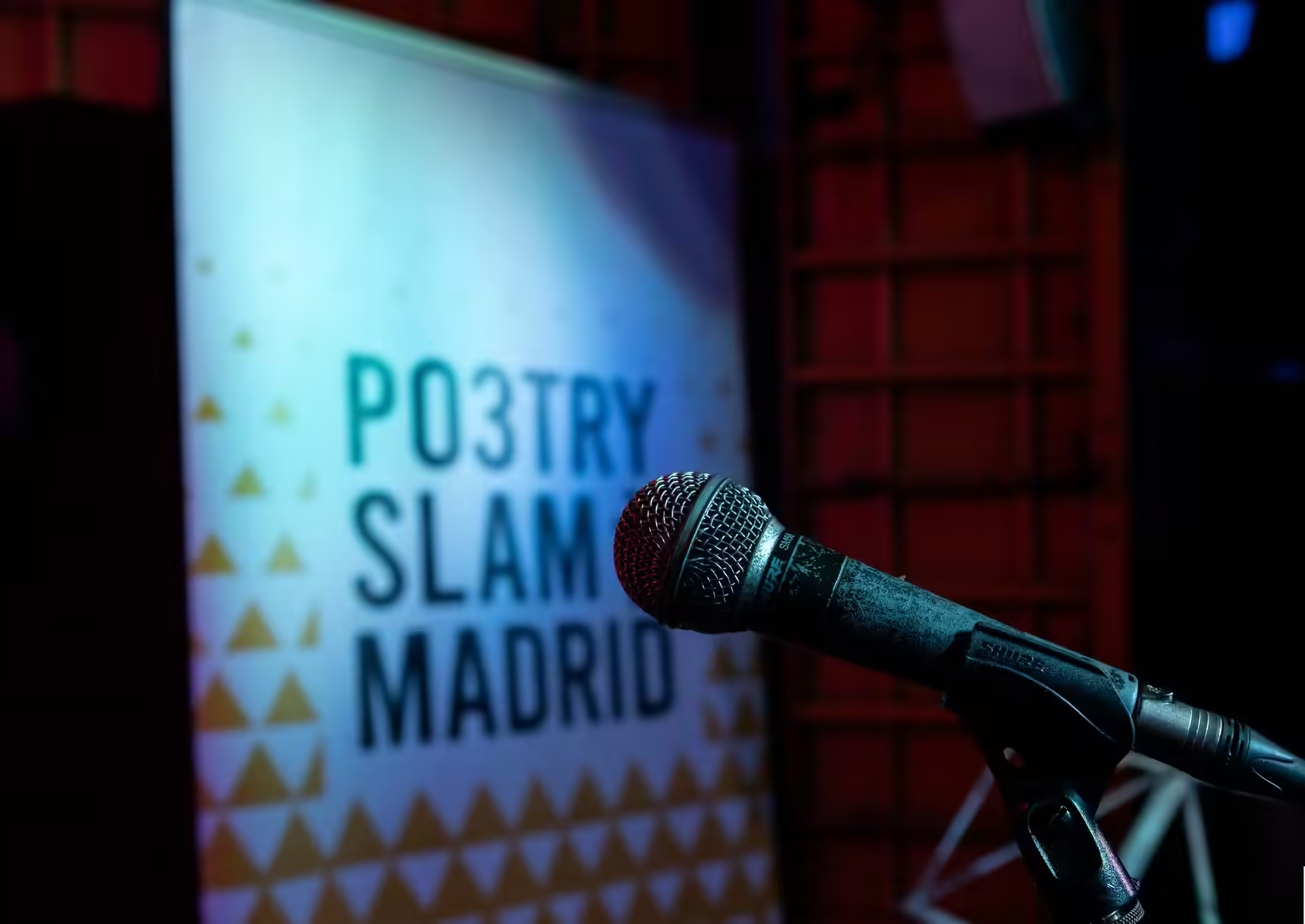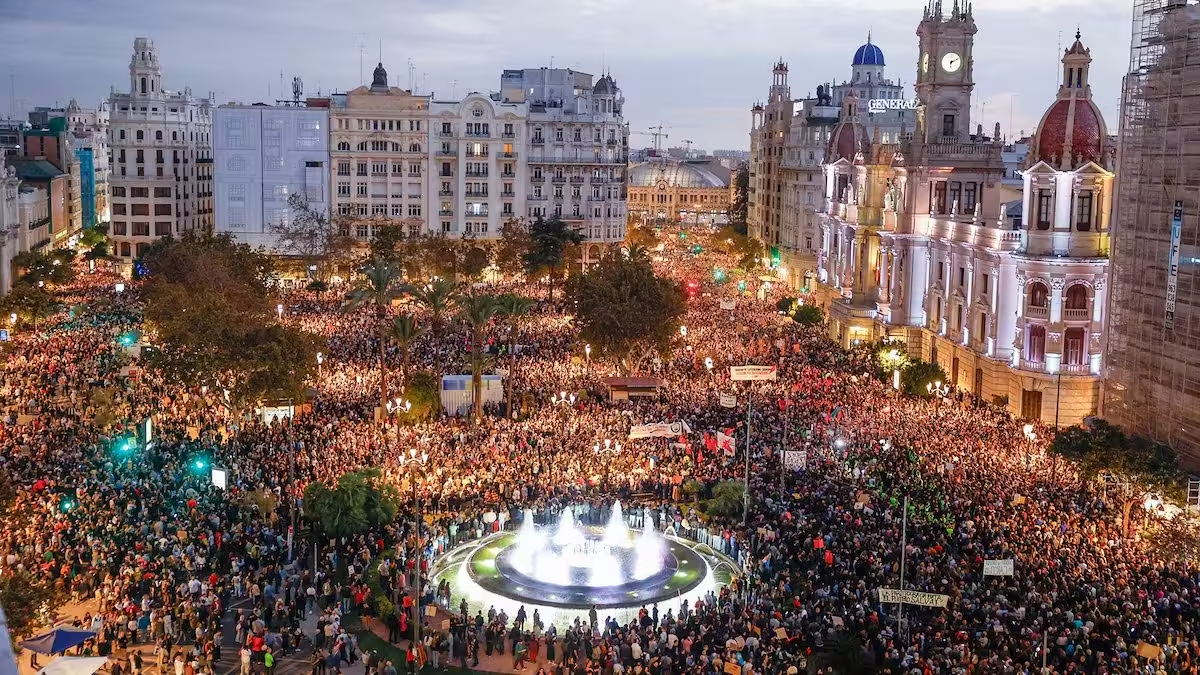Inspired by the World: How Poetry Slam Came to Spain
Ybernia Bilingual Publishing House continues its collaboration with Jonathan Teuma in this insightful guest post, the third in the series. In this article, Teuma delves into the origins of Poetry Slam in Spain, tracing its roots from Madrid’s Libertad 8 bar to the international influences that helped shape the scene. Through his experiences, he highlights how the slam movement grew into a powerful artistic platform, bringing poets and audiences together in a unique celebration of spoken word.
The Author: Jonathan Teuma is a poetry slammer and writer. His latest book is called Yaniku Universal (published by Ybernia), a series of haikus that play around with Llanito, a dialect found in Gibraltar that is influenced by both English and Spanish.
Cold and wet, the last Wednesday night of February ’09 opened up a door to a warm and cosy bar that housed freedom both in name and nature. I didn’t know it yet but the Libertad 8, dubbed so for the street and number upon which it lay, had been an anti-fascist hub for much of the 70’s, even housing the railway section of the Spanish Communist Party for a time. The whole street had lived up to its name with secret cells of the communist party and the anarchist trade union CNT, operating from there during most of Franco’s long dictatorship. When the stringent seventies gave way to the madness of the Movida Madrileña, the Libertad 8 became a haven for intellectuals, and by the time the 90’s arrived with Spain’s full embrace of the free market, embodied in that light-hearted, fun-loving, soul-crushingly commercialised tune we all know as La Macarena, the counter-culture cavern became a refuge to singer-song writers. Now, even though it was a Poetry Slam I was coming to, nobody had any idea that a new cycle was starting and it was poets and slammers turn to cry freedom! from freedom’s small stage at Libertad 8 and many others across Madrid.
The whole event went by in a flash. I’d arrived late so I had to watch most of it from a crammed spot between curtains that separated bar from stage area. Slammer after slammer went up and spouted verses in every which way. Seasoned performers weighed their words and pauses while others clutched their notebooks and hid behind the mike and yet others jumped up and around the tiny stage rapping to some beat inside their minds. The crowd laughed and cheered throughout showing love to their favourites and benevolence to struggling and starting artists. All the while Elo, red-haired, marvellously kitsch and as blunt as she was sharp (very, in both cases), kept the proceedings going, the humour good, and the point on the poetry, not on the points. I was in love, with the event of course. The energy, the freedom, the diversity, it felt both new and ancient and I wanted more. Before I left, I had signed up for the next month.
It’s funny how we fill that gap between perception and reality. Dressed, as it was, in the garb of a centennial establishment, with its red doors and brown wooden beams framing the bar, stage, tables and chairs, with its high energy and grounded rules, Poetry Slam Madrid felt like it had been there forever, at the very least. Perhaps it had evolved from medieval poetry jousts or from underground recitals evading Franco’s watch. But no, I soon found out the Poetry Slam had been invented just a couple of decades earlier, in the States! (We’ll get into that later) and had been brought to Madrid just one month before I stumbled upon it, that January ’09, by Germans! Not that it makes any difference but again, it’s funny how we fill in the gaps with whatever takes our fancy.
German roots
The Slam, apparently, was massive in Germany with most major cities holding anywhere from a handful to a few dozen slams. Networks were set-up and while young slammers kept coming in the doors, older more established slammers were getting invited to events across the country and getting paid for their performances. Such was (and is) the public and institutional embrace for the Slam in Germany that the Goethe Institute holds an unspoken mission to found Slams in cities where there are none. And so it was that Rebeca Castellano Alonso from the Goethe Institute Madrid took it upon herself to deliver this game to the children of Lorca.
Slams in Spain were practically unheard of at the time and so for the first few years of its existence Poetry Slam Madrid was truly an artistic laboratory. The Goethe’s clear understanding of the spirit of the slam was embodied in Rebecca’s clockwork organisation of events and Elo’s quirky transmission of its message. Yes, it’s a competition but no, we don’t really care who wins. Yes, points will be deducted for going over the time limit but no, that is not the point, the point is that we all sit back and enjoy some poetry… Shut up now! The poet’s on.
The final beam on this triangular frame the Goethe provided was its guests. Flown in mostly from Germany, but also Switzerland, Austria, Poland and Hungary they were instrumental in setting the tone of what a Slam should be. It wasn’t that they shared uniformity in style or content, there were some who lent towards comedy and the absurd, others employed beat boxing and hip-hop rhythms in their rhymes and those who swept through with torrential spells of free verse. However, there were some fundamental unwritten Slam maxim’s they all mastered and laid down for us by simply putting on their shows.
The first and most important of these was stage presence. In fact, everything else probably flows from this. It is what distinguishes a Slam from all other poetry recitals. Not an excuse for sloppy poetry but an impulse to deliver what you have written with the feeling that you have written it. Not to jump around the stage without thought or direction but to embody your poem and do it justice before a group of people who will give you the silence and respect necessary to share your work. The guests of course were brought in for a reason. They were all masters of their craft, successful in countries were the slam had already been running for years, if not decades. None of them read their poems. All of them measured their actions and controlled their prosody in manners that favoured the delivery of their texts.
They set an example, and it did not matter that most of us watching from the crowd could not understand German, Polish or Hungarian. Such was their mastery of rhythm, tempo, volume, silence and their own bodies, that for the duration of their 15/20 minutes sets they always managed to engage the audience and – with just some context in English/Spanish prior to the poem – transmit the underlying message in their work. It was inspiring, and while most of the above might seem obvious to any performing artist, it was completely unheard of in the world of poetry at the time.
Fortunate beginnings
So now you know the framework, and how the Slam landed, we can talk about those early days of Poetry Slam Madrid. As I mentioned above, round about that time, singer-songwriters began to give way to poets on the small-stage. I’d like to tell you it was due to the overwhelming impact that the first generation of slammers had on the scene, or that it was fuelled by a new renaissance of the early 21st century that turned minds to more literary interests, but no. Unfortunately, the answer was more sinister. It was local politicians who unwittingly opened the door to the poets of the day. The conservative leaders running Madrid’s City Hall had for some reasons turned their attention to the smaller establishments and began to revoke or refuse to confer live music permits.
The result was that many bars and taverns that had previously relied on small bands and singer songwriters to bring a crowd in now turned to poets. Los Diablos Azules, Bukowski (the bar not the poet), Sala Clamores, Calvario bar, El Aleatorio, Tapas y Fotos, El Vergüenza Ajena, the list of establishments holding open mikes mushroomed in just a couple of years. Packed from wall to wall, the thirst for art on stage was tangible and poets were stepping up all over the place. The Slam however, was different. There was a buzz to it that no other jam had and it was a combination of factors that led to this.
The thrill of competition
For starters there’s the competition. This was very important in terms of the audience. The Slam brought in a different crowd. Most other jams and open mikes were full of poets waiting for their turn to recite. Many weren’t even interested in what others had written. Here the gimmick worked and people came for the competition yes, but they stayed because they heard the poets and were touched by them. The crowd in a Slam also forms an integral part of the competition as they choose the winners. They are silent during the performances and raucous at their end.
The competition also had a good effect on us poets. For starters we all wanted to win, no question, and that made us work on our deliveries, rewrite and memorise our poems, observe each other and recite with vigour. More importantly though, the competition brought our egos out into the open and helped us manage them. Other jams claimed their existence lay in a pure love of the art, poets there supposedly solely attended for the joy of sharing their work and learning from others. And while that was certainly the case for some, the fact remained that many jams lacked any real engagement between the participants. They were poets who spoke over other poets as they recited, poets who asked to go first in line so they may recite and go home early, poets who smoked joints outside while others bled out inside, audiences of poets only interested in their own poems. With the slam you announced your ego, your belief that your poetry was the best that night from the moment you sign up. Once done, and once you have observed the delightfully absurd subjectivity of the judges’ whims and the absolute immeasurability of a verse’s impact upon a human’s heart, your ego comes down to size, you learn to laugh at it and put it aside for while. You still want to win mind you, but you’ve learnt now, it’s just a game.
Passing the torch
After about a year and a half of running things The Goethe Institute passed the torch on to those of us who participated most assiduously. So, it was that Elo Juarez (the presenter), Silvia Nieva, Dani Orviz (future European and World Slam champion) and myself, founded the Poetry Slam Madrid cultural association. 14 years later the association has seen members come, go and stay, though we are still active, not only organising the monthly slam session but also supporting budding slams as they appear, inviting poets from all over Spain, Europe and the world to participate in our regular slams as well as our annual Poetry Festival, SLAMMADRID, and providing performance poetry workshops to schools, prisons, and the general public. The poetry slam movement is easily the biggest poetic movement in history, involving poets from all over the world and Poetry Slam Madrid is certainly proud to be a part of it.
To learn more about Jonathan Teuma, his journey in the world of Poetry Slam, and his latest book Yaniku Universal, visit Ybernia Bilingual Publishing House and feel free to explore the links below:
For more Information about Yaniku Universal click here
Explore their online book store: Click here
Main image: Facebook/Poetry Slam Madrid
Share this content:




3 comments